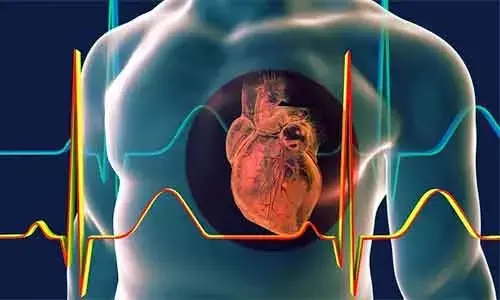- Home
- Medical news & Guidelines
- Anesthesiology
- Cardiology and CTVS
- Critical Care
- Dentistry
- Dermatology
- Diabetes and Endocrinology
- ENT
- Gastroenterology
- Medicine
- Nephrology
- Neurology
- Obstretics-Gynaecology
- Oncology
- Ophthalmology
- Orthopaedics
- Pediatrics-Neonatology
- Psychiatry
- Pulmonology
- Radiology
- Surgery
- Urology
- Laboratory Medicine
- Diet
- Nursing
- Paramedical
- Physiotherapy
- Health news
- Fact Check
- Bone Health Fact Check
- Brain Health Fact Check
- Cancer Related Fact Check
- Child Care Fact Check
- Dental and oral health fact check
- Diabetes and metabolic health fact check
- Diet and Nutrition Fact Check
- Eye and ENT Care Fact Check
- Fitness fact check
- Gut health fact check
- Heart health fact check
- Kidney health fact check
- Medical education fact check
- Men's health fact check
- Respiratory fact check
- Skin and hair care fact check
- Vaccine and Immunization fact check
- Women's health fact check
- AYUSH
- State News
- Andaman and Nicobar Islands
- Andhra Pradesh
- Arunachal Pradesh
- Assam
- Bihar
- Chandigarh
- Chattisgarh
- Dadra and Nagar Haveli
- Daman and Diu
- Delhi
- Goa
- Gujarat
- Haryana
- Himachal Pradesh
- Jammu & Kashmir
- Jharkhand
- Karnataka
- Kerala
- Ladakh
- Lakshadweep
- Madhya Pradesh
- Maharashtra
- Manipur
- Meghalaya
- Mizoram
- Nagaland
- Odisha
- Puducherry
- Punjab
- Rajasthan
- Sikkim
- Tamil Nadu
- Telangana
- Tripura
- Uttar Pradesh
- Uttrakhand
- West Bengal
- Medical Education
- Industry
Guidelines for Physical Activities in heart failure by the French Society of Cardiology

Physical activity is important in heart failure to improve functional capacity, quality of life and prognosis, and is a class IA recommendation in the European Society of Cardiology guidelines. The benefits of exercise training are widely recognized. Cardiac rehabilitation centres offer tailored exercise training to patients with heart failure, as part of specialized multidisciplinary care, alongside pharmacological treatment optimization and patient education. After cardiac rehabilitation, maintenance of regular physical activity long term is essential, as the benefits of exercise training vanish within a few weeks. Unfortunately, only 10% of patients benefit from a cardiac rehabilitation programme after hospitalization for acute heart failure, and the majority of patients do not pursue long-term physical activity.
Two Working Groups of the French Society of Cardiology (the heart failure group [Groupe Insuffisance Cardiaque et Cardiomyopathies; GICC] and the cardiac rehabilitation group [Groupe Exercise Réadaptation Sport et Prévention; GERS-P]) have released a paper to discuss the obstacles to broader access to cardiac rehabilitation centres and propose ways to improve the diffusion of cardiac rehabilitation programmes and encourage long-term adherence to physical activity.
According to the World Health Organization, physical exercise is a movement produced by skeletal muscles that account for a rise in energy consumption. PA is characterized by the frequency, intensity, duration and type of physical exercise. The term Exercise Training refers to regular PA of significant intensity and duration.
Cardiac rehabilitation was defined by the World Health Organization in 1964 as "the set of measures aimed at restoring the patient's previous abilities and improving the patient's physical and mental condition so that he or she can regain by his or her own means a place in society as normal as possible"
Major recommendations are-
- Exercise Training should be offered to patients with heart failure regardless of their New York Heart Association class, including patients undergoing ventricular assistance and candidates for heart transplantation.
- Advanced age is not a contraindication. However, age-related co-morbidities, such as cognitive disorders, disabling neurological conditions, severe osteoarticular problems or depression, might compromise ET.
- Contraindications to physical exercise are mainly transient conditions, such as the acute phase of myocardial infarction, severe cardiac arrhythmias, acute myocarditis or pericarditis, symptomatic severe aortic stenosis or mobile intracardiac thrombus.
- All patients with HF should ideally be referred to a CR centre, especially after an acute decompensation. In this situation, CR may begin early under specialized supervision
The different phases of cardiac rehabilitation
Phase 1
In-hospital rehabilitation
Resumption of moderate PA at the immediate end of the acute phase
Cardiologists, physiotherapists
Phase 2
20 to 40 sessions in CR centre
Inpatient or outpatient setting
Endurance, respiratory and resistance training
Cardiologists, physiotherapists/specialized PA educators
Phase 3
Long-term maintenance
No medical assistance/supervision; currently no reimbursement
Fully dependent on the patient's motivation and assiduity
The patients become responsible for themselves
Heart and Health clubs/fitness clubs/outdoor PA
PA is a key element in the management of HF, allowing improvement in functional capacity and prognosis; however, its effectiveness is hampered by the limited use of CR for patients with HF and insufficient adherence.
An increase in the supply of CR requires decentralization of the Exercise Training on offer. Development of new digital tools and delegation of tasks to trained paramedics create opportunities to increase the solution available to patients with HF
For more details click on the link: https://doi.org/10.1016/j.acvd.2019.07.003
Hina Zahid Joined Medical Dialogue in 2017 with a passion to work as a Reporter. She coordinates with various national and international journals and association and covers all the stories related to Medical guidelines, Medical Journals, rare medical surgeries as well as all the updates in the medical field. Email: editorial@medicaldialogues.in. Contact no. 011-43720751
Dr Kamal Kant Kohli-MBBS, DTCD- a chest specialist with more than 30 years of practice and a flair for writing clinical articles, Dr Kamal Kant Kohli joined Medical Dialogues as a Chief Editor of Medical News. Besides writing articles, as an editor, he proofreads and verifies all the medical content published on Medical Dialogues including those coming from journals, studies,medical conferences,guidelines etc. Email: drkohli@medicaldialogues.in. Contact no. 011-43720751


